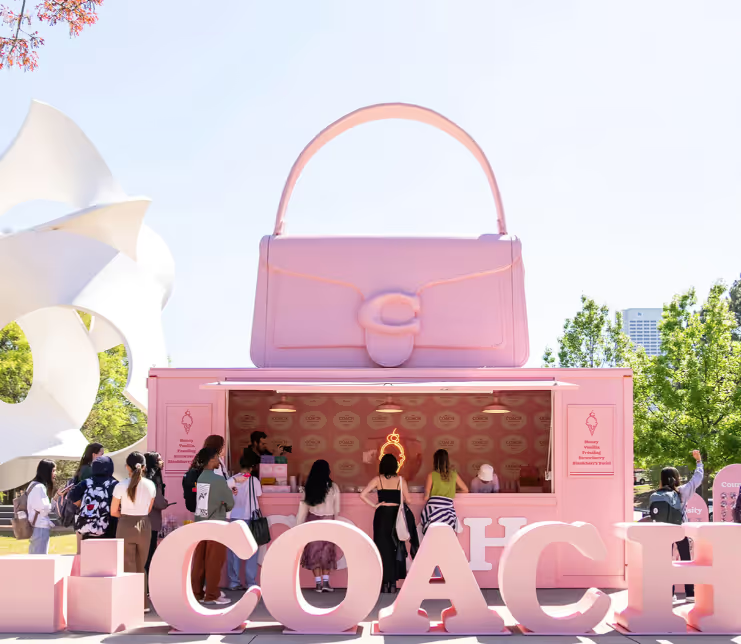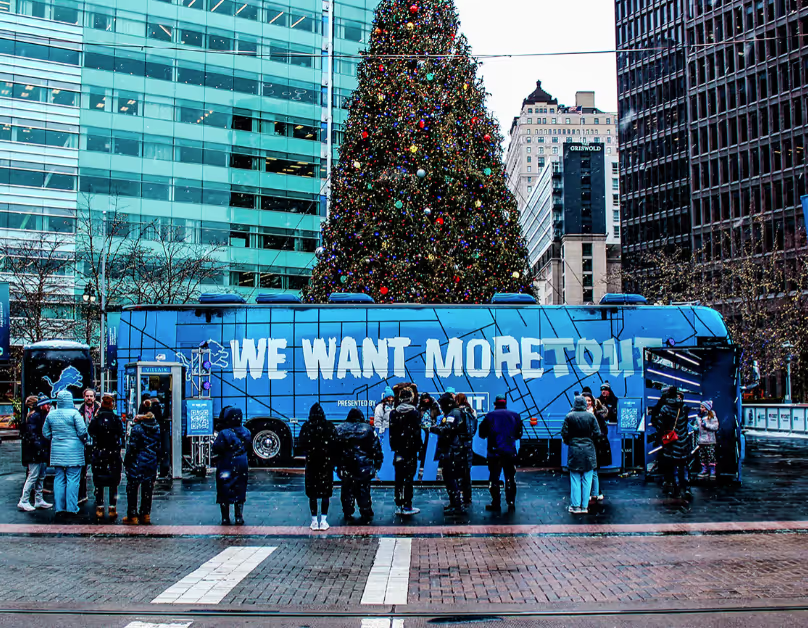Brand Activation Roadshows: Face-to-Face Consumer Connections
Brand activation roadshows bring brands directly to consumers through mobile marketing tours that visit high-traffic locations across multiple markets. Mobile brand activations create face-to-face interactions that generate immediate engagement, build authentic relationships, and deliver measurable results that traditional marketing methods cannot replicate.
Increase brand visibility and find new leads using brand sponsorship strategies that position your brand at events where your customers already gather.
Mobile Marketing Tours and Their Impact on Brand Awareness
Mobile marketing tours create unparalleled brand exposure by establishing direct consumer relationships in high-traffic environments where audiences naturally gather. This approach surpasses traditional advertising methods by providing interactive experiences that encourage engagement opportunities, social media sharing, word-of-mouth promotion, and immediate brand recall.
What Makes Brand Roadshow Activations Drive Consumer Engagement
Brand roadshow activations are traveling experiences built around custom mobile environments that house product demonstrations, sampling stations, and interactive displays. These mobile tours can feature hands-on product trials, educational content, giveaways, and photo opportunities that encourage social sharing and extend reach beyond event attendance. Brands can position these mobile experiences at colleges, festivals, retail locations, and business districts to connect with consumers in familiar settings. Face-to-face interactions through mobile marketing create opportunities for product education, relationship building, and authentic brand conversations that digital advertising cannot achieve.
Mobile Tour Campaign Examples
Mobile marketing tours deliver different outcomes depending on audience and objectives. Here are three examples that demonstrate various approaches and results:
- Contractor Appreciation Tour: Benjamin Moore's mobile trailer featured product demonstrations, comparison walls, and premium gifts to build relationships with painters and contractors at retail locations.
- College Campus Tour: Coach's Tabby Tour used digital quizzes, coordinated giveaways, and photo opportunities to introduce handbag collections to college students while generating social content.
- Fan Engagement Tour: Detroit Lions' playoff tour included surprise appearances, merchandise giveaways, and interactive phone booths with ticket prizes to energize fan communities across Michigan.
Generate media coverage and consumer buzz with press activation events that bring your brand directly to journalists and influencers through custom mobile experiences.


Measuring Brand Impact Through Mobile Event Experiences
Mobile marketing tours generate specific data points that help brands understand audience response and campaign performance. Tours track attendance numbers, interaction time, social media posts, and leads collected to calculate return on investment. Follow-up surveys measure brand recall and purchase interest after events to determine lasting impact. Social media tracking shows how many people post about the experience, use campaign hashtags, and share content with their networks. This data helps brands evaluate what worked and plan improvements for future tours.
Planning for Mobile Marketing Events
Marketing tours need upfront planning to reach the right audiences within budget and timeline constraints. Planning covers audience research, route selection, vehicle design, staffing, and permits to execute tours that deliver results:
Audience Research and Market Selection for Mobile Tours
Roadshow events start with identifying where target customers spend time and when they're most likely to engage. Key research areas include:
- Demographics Analysis: Age, income, and lifestyle data help determine which locations will have the highest concentration of ideal customers.
- Location Selection: College campuses work for younger audiences, business districts for B2B campaigns, and entertainment venues for lifestyle brands.
- Geographic Factors: Population density, accessibility, parking availability, and local permit requirements influence stop selection.
- Regional Preferences: Market research reveals local tastes and customs that can be incorporated into programming while maintaining brand consistency.
Financial Planning and Return Investment for Mobile Activations
Mobile tour budgets include vehicle wrapping, rental, staff wages, fuel, permits, and giveaway items. Brands typically compare these costs to what they'd spend on digital ads or billboards to reach the same number of people. ROI comes from multiple sources: direct sales at events, leads collected for follow-up, social media posts and shares, and brand recognition surveys. Some brands track whether tour participants become repeat customers or recommend the brand to others. These different metrics help calculate the total value generated from tour investment.
Operational Management for Roadshow Success
Running roadshows across different cities requires managing logistics, people, and paperwork in multiple markets. Major operational areas include:
- Fleet Management: Vehicle maintenance, route planning, and DOT compliance for interstate travel keep campaigns running smoothly.
- Staffing Coordination: Brand ambassador training, local team hiring, and management oversight throughout the campaign duration.
- Permit Acquisition: Legal permits, media permits, and venue approvals that vary by city and require advance planning.
- Contingency Planning: Backup plans for weather delays, vehicle breakdowns, and schedule changes to keep campaigns on track.
Building Brand Loyalty Through Mobile Marketing Experiences
Roadshows build lasting brand relationships through face-to-face interactions that people remember and talk about with friends and family. Personal conversations and hands-on experiences create connections that encourage customers to return and recommend the brand to others:
Creating Memorable Brand Interactions That Generate Organic Promotion
Interactive experiences encourage people to post about their visit and tell friends what they discovered. Photo opportunities, exclusive products, and surprise moments give people reasons to share content on social platforms. When people post about positive brand experiences, their friends see authentic recommendations rather than paid advertisements. Unique giveaways, surprise interactions, and exclusive access turn event attendees into brand advocates who naturally promote to their personal networks. This word-of-mouth promotion reaches new audiences while building credibility through trusted personal recommendations.
Post-Tour Engagement Strategies for Sustained Consumer Relationships
Follow-up communication maintains connections established during mobile tour interactions through targeted email campaigns, social media engagement, and exclusive offers. Consumer experience data collected during events enables personalized communication that continues brand storytelling beyond the physical event.
Retargeting strategies use mobile tour participant data to deliver relevant content and offers through digital channels. This integrated approach maintains brand presence in consumer consideration while nurturing relationships toward conversion.
Incorporating Mobile Tour Insights Into Brand Strategy Development
Roadshow data indicates what resonates with customers and what doesn't, informing future marketing decisions and product development. Face-to-face conversations uncover customer preferences, complaints, and suggestions that surveys often miss. Performance data tracks which activities drew the biggest crowds, which giveaways people wanted most, and which locations generated the best response. This information helps brands plan better events, choose more effective promotional items, and allocate budgets to activities that deliver the strongest results.
Brand Activation Roadshows With Activate
Activate designs and executes mobile marketing tours that deliver branded experiences with measurable results. Our capabilities include custom vehicle design, route planning, staffing, logistics management, and performance analysis. From our 75,000 square foot facility, we provide turnkey solutions that bring brands directly to their audiences through impactful experiences. Ready to activate your brand through mobile marketing tours? Fill out our contact form to develop a roadshow strategy that drives engagement, builds loyalty, and delivers quantifiable results for your business.
Frequently Asked Questions
What is a brand roadshow?
A brand roadshow is a mobile marketing tour that brings immersive brand experiences directly to target audiences across multiple markets through custom-designed vehicles and interactive programming. These traveling brand activations feature product demonstrations, sampling opportunities, and engagement activities that create meaningful connections between brands and consumers in high-traffic locations.
How to do a brand activation?
Executing a brand activation requires strategic planning that begins with audience research, budget allocation, and creative concept development tailored to specific campaign objectives. The process involves custom vehicle design, route planning, staffing coordination, permit acquisition, and performance measurement to deliver branded experiences that generate measurable results and lasting consumer relationships.
Why are roadshows effective?
Roadshows are effective because they create direct, personal interactions between brands and consumers that traditional advertising cannot replicate, fostering authentic connections through hands-on experiences. These mobile brand activations generate organic social media content, word-of-mouth promotion, and immediate brand recall while providing comprehensive data collection that demonstrates clear return on investment.
